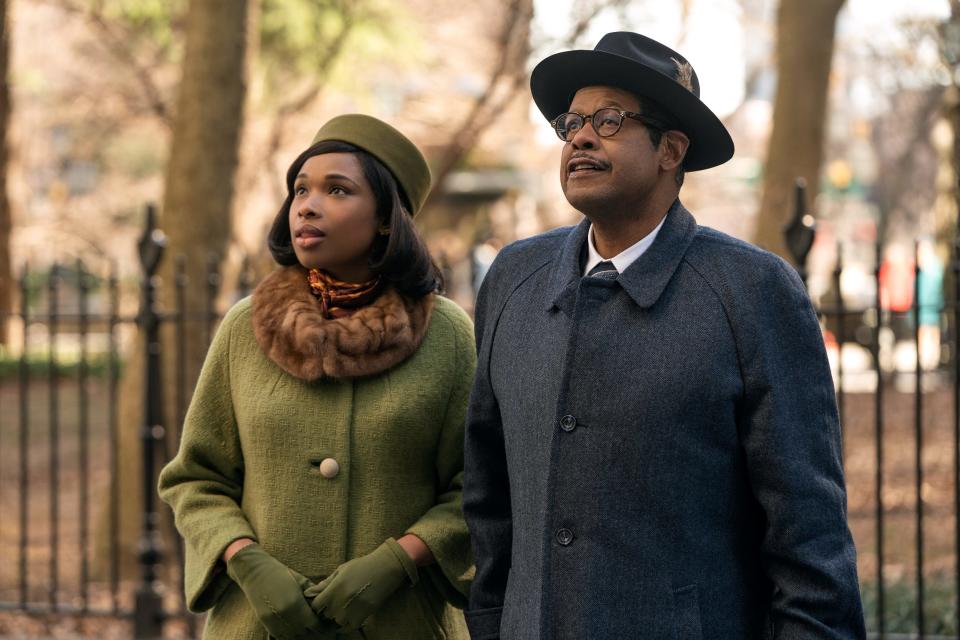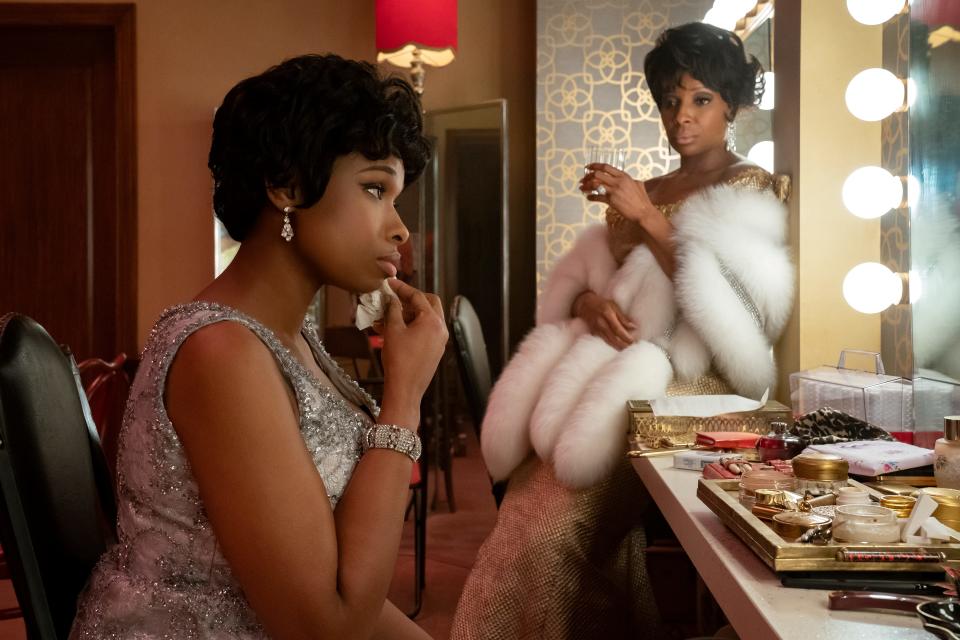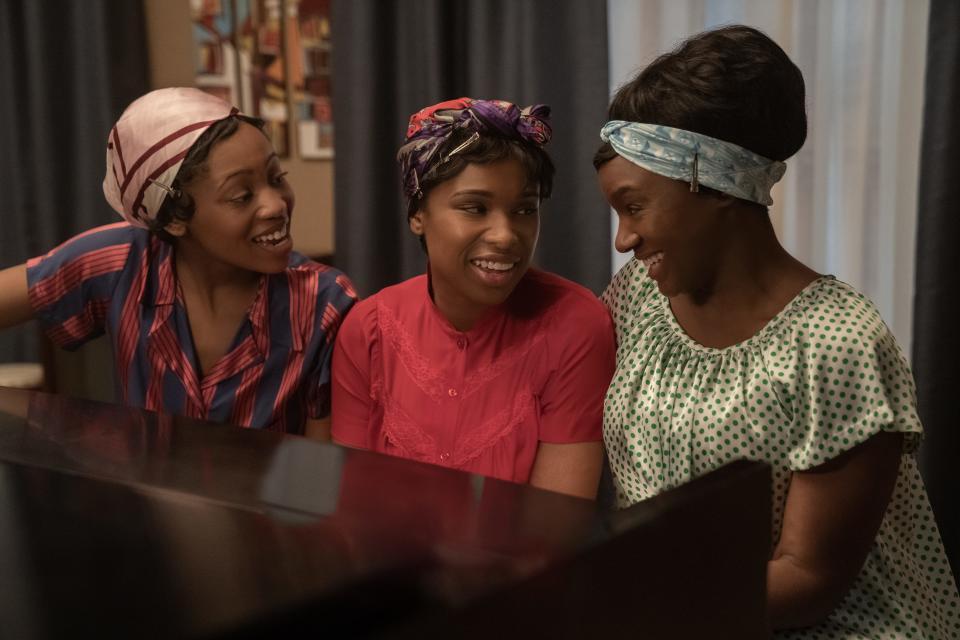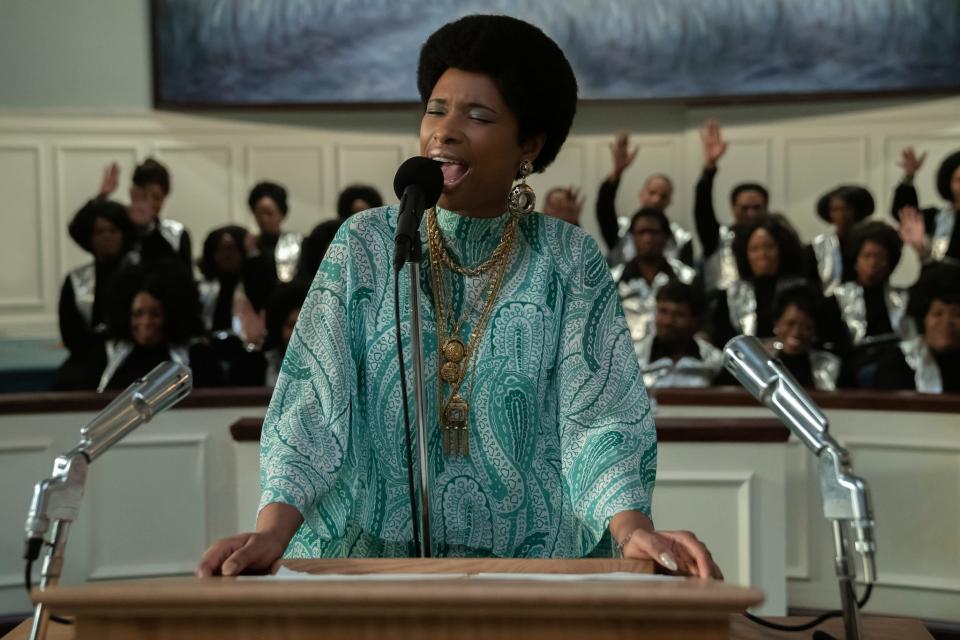Fact-checking 'Respect': What the Aretha Franklin biopic gets right, wrong about her life

The new biopic “Respect” runs through two decades of Aretha Franklin’s life in 2? hours, starting at age 9 and culminating with her back-to-the-roots gospel project “Amazing Grace.”
The film, starring Jennifer Hudson as the Queen of Soul and Forest Whitaker as her father, C.L. Franklin, is the movie directorial debut of Broadway veteran Liesl Tommy.
Tommy and her team say they sought to present a Franklin story that felt authentic, and they took pains to nail certain details – dissecting her recordings to accurately re-create the music, for instance, or using original blueprints to replicate the Franklin family home.
But for moviegoers, there are bound to be questions about key moments and plot points depicted in "Respect."
And they’ve got good reason to have their guard up: In recent years, music biopics have been called out for the history they've screwed up – from Queen’s “Bohemian Rhapsody” to “The United States vs. Billie Holiday,” not to mention this year’s other big Franklin project, the TV series “Genius: Aretha.”
Here’s some clarity on “Respect”:

Did Dinah Washington curse and turn a table over when Aretha Franklin dared sing 'Unforgettable'?
In a scene set at New York’s Village Vanguard club in 1964, Washington (Mary J. Blige) becomes incensed when the little-known Franklin begins to play “Unforgettable,” one of the jazz great’s signature numbers.
Flipping her table in disgust, Washington curses at Franklin for daring to cover her song in her presence.
It’s unlikely that ever happened – at least not with Franklin.

Rather, the episode seems to be drawn from an incident involving Etta James, who once told writer David Ritz how Washington reacted badly when James performed “Unforgettable” during a Rhode Island set.
James said she ran to her dressing room in tears, later to be consoled by some mentoring words from Washington herself – just like “Respect” depicts the Aretha situation.
In Franklin’s 1998 memoir, "From These Roots," also written by Ritz, the singer recounted a less incendiary encounter with Washington, following a Detroit performance: The visiting Queen of the Blues chided Franklin for leaving shoes all over the dressing room.
Review: As Aretha Franklin, a soulful Jennifer Hudson keeps 'Respect' from hitting the wrong note
Was Aretha Franklin raped as a young girl by a guest at her father’s home?
In “Respect,” Aretha is seen as a 10-year-old in her Detroit bedroom when an older, unnamed male house guest wanders in, offering to be her “boyfriend.” In a later flashback, it's implied that’s when she was violated and impregnated.
The paternity of Franklin’s oldest son has long been shrouded in mystery. She was 12 when she gave birth to Clarence, and some accounts through the years contended the father was a schoolmate named Donald Burke. Others speculated she was raped while on the road down South, traveling with her father's gospel caravan.
But in a will purportedly handwritten by Franklin and discovered after she died in 2018, she identifies a man named Edward Jordan Sr. as the father of Clarence. Though few details about him have circulated, Jordan was known to have fathered her son Edward, born when Franklin was 15.
In the will, Franklin emphatically declares that Clarence's father is to receive no money or property: "He has never made any contribution to his welfare, future or past."
Did the Beatles really offer Aretha an exclusive song – which she turned down?
Yes and no.
In “Respect,” producer Jerry Wexler (Marc Maron) tells Franklin she has been offered a song to record, and if she passes, the Beatles want it for themselves.
The composition in question: “Let It Be.”
Franklin is seen rejecting the idea. It’s a Catholic song, she says, and “I’m Baptist.” (If Aretha really did perceive “Let It Be” that way, she’s certainly not alone – though the song’s “Mother Mary” lyric is actually a reference to Paul McCartney’s late mom.)

In reality, according to Wexler, the Beatles had sent him an early demo of the gospel-inflected McCartney song and Franklin did record it. Though she initially hesitated to release the track, it appeared on her seventh Atlantic Records album, alongside another Beatles cover, “Eleanor Rigby.”
In fact, her take on the song, released in January 1970, beat the Beatles to the punch: The world wouldn’t hear the group's own version of “Let It Be” until their single was released two months later.
Did Aretha Franklin really fall off the stage in a drunken stupor during a concert?
In spring 1967, the singer definitely had an onstage mishap during a Columbus, Georgia, performance, breaking her arm. That May, Jet magazine published a photo of Franklin in a sling at Detroit’s Henry Ford Hospital.
The cause of the accident is murky. At the time, the official explanation was that Franklin had been blinded by stage lights. But her agent Ruth Bowen, talking years later with biographer Ritz and relaying what she had been told by one of Franklin’s assistants, claimed the singer may have been “tipsy.”
In the movie, her drunken onstage collapse is placed later in the '60s, as Franklin wrestles with fame and the death of Martin Luther King Jr. She hits the deck while mumbling her way through “I Say a Little Prayer,” a chart smash for her in fall 1968.
But the real-life incident happened much earlier, when Franklin was tasting her first success with Atlantic.
Did Jerry Wexler name Aretha the Queen of Soul?
Here, “Respect” is a bit fuzzy: Maron's Wexler, pictured speaking to cameras for a promotional video, affirms Franklin’s status as “Queen of Soul.” The movie doesn’t explicitly give the producer credit for the coronation, but viewers may be left with that impression.
While not depicted in the film, the title was bestowed on Franklin in early 1967 by Chicago disc jockeys Pervis Spann and E. Rodney Jones. It came as they honored her at a Regal Theater event, with Spann placing a crown on her head.

Did everybody really call her 'Ree'?
Ree? Not really, according to family members.
While that nickname would later become popular for some inside Franklin’s circle, it wasn’t the go-to moniker during her younger life. Contrary to what’s seen in “Respect,” where “Ree” flies left and right, friends and family called her "Aretha."
In the movie, the nickname is even depicted as the inspiration for one of the signature backing vocals in the hit song “Respect”: As Franklin’s sisters help her work out the tune at a piano, they start singing “Ree-Ree-Ree” in tribute to her.
In truth, that backup vocal hook was likely just a catchy spin on the title – “Reeeee-spect.”
Franklin’s kin say the movie whiffed on another intimate family detail. In a scene set at her California home, a frazzled Aretha is snapping at everyone around her. Amid the tension, her grandmother – Big Mama, as she was known – agrees to take the singer’s young sons back to Detroit. Just one hitch: Big Mama wouldn’t have been there. She didn’t travel.

Did C.L. Franklin offer words of encouragement just before a nervous Aretha recorded 'Amazing Grace'?
While her preacher father was present at the Los Angeles church where “Amazing Grace” was captured in 1972 for a best-selling gospel album and documentary, he wouldn’t have given her a pep talk in a stairwell beforehand.
That’s because C.L. Franklin didn’t show up until Day 2.
C.L. Franklin took to the pulpit that second night to address the congregation, just before Aretha performed the song that had been her first professional recording, “Never Grow Old.”
In unreleased footage from Sydney Pollack’s documentary shoot, C.L. Franklin describes how he crammed clothes into a suitcase and hopped onto a last-minute flight from Detroit to make the final day of the sessions.
This article originally appeared on Detroit Free Press: Aretha Franklin fact check: What 'Respect' gets right, wrong in movie
Solve the daily Crossword

